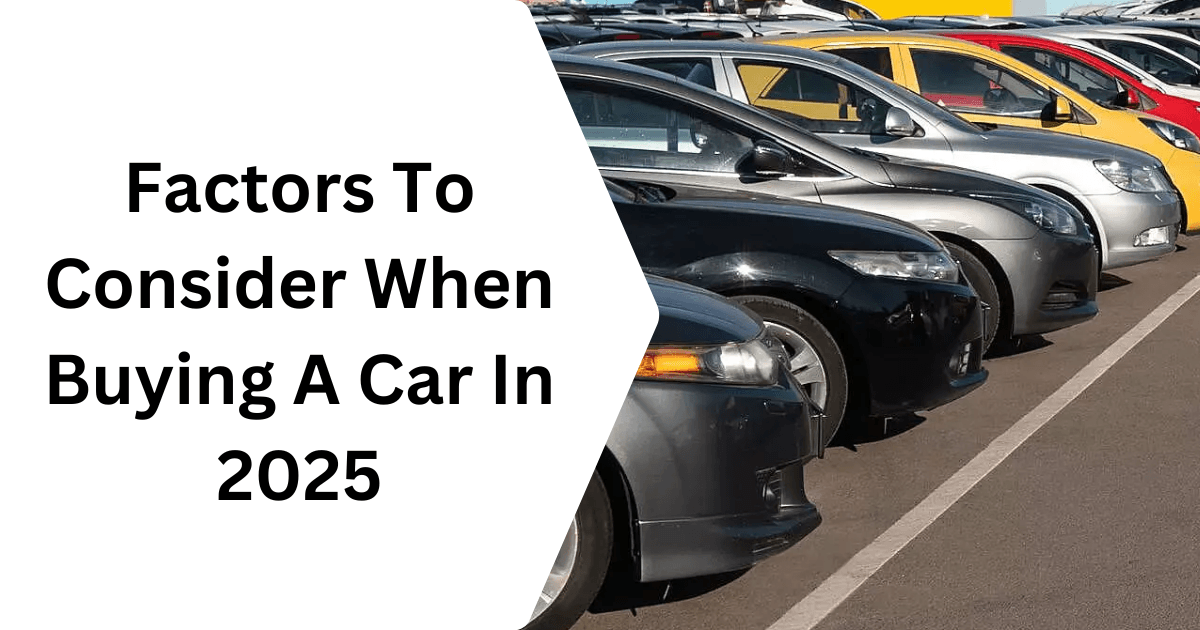Finding the right car is about more than just looks—it’s about how well it fits your everyday needs. Whether you’re after a compact car for quick trips to the store or a larger SUV packed with features for family road trips, the decision should be based on your specific requirements. Are you going to drive off-road frequently? Do you need extra room for cargo or advanced safety features for peace of mind? As you think about buying a car in 2025, it’s essential to balance practicality with comfort and safety to get the best value for your investment.
This guide will walk you through the essential things to think about when purchasing a car in 2025. We’ll explore important aspects like your budget, the car’s durability on rough roads, and the availability of spare parts.
Your Budget
Your budget is the first and perhaps most important factor to consider when buying a car. It sets the stage for whether you’ll opt for a new car, a certified pre-owned vehicle, or a used one. A realistic budget should include not just the upfront cost of the car but also registration and insurance. If buying outright isn’t an option, you can explore car financing as a practical alternative. Check out our tips in the next post to make the best choice for your needs!
Beyond the initial purchase price, you should also factor in your regular maintenance costs, which include ongoing expenses like fuel, maintenance, and repairs. Some cars are more fuel-efficient than others, and in Nigeria, where fuel prices can fluctuate, owning a fuel-efficient vehicle can save you a lot of money over time. Additionally, certain cars may have higher maintenance costs due to the availability and price of spare parts. Thinking about these ongoing expenses when setting your budget will help you avoid surprises down the road.
Financing options can also influence your budget. If you’re considering a car loan, make sure to evaluate interest rates and repayment terms. Many Nigerian banks and car dealerships offer financing plans, but it’s crucial to choose one that fits within your financial means. Low monthly payments might seem attractive, but they often come with higher interest rates in the long term. It’s important to balance affordability with the total cost of the loan to avoid paying significantly more for the car than you initially intended.
The Resale Value
Resale value is a crucial factor to consider when buying a car, especially if you plan to sell or upgrade in the future. Some brands hold their value better than others, meaning you can get a higher return when it’s time to sell.
Market demand can also influence a car’s resale value. Certain cars may be in higher demand in Nigeria due to factors like fuel efficiency, road durability, or availability of parts. Vehicles that are known to handle Nigerian road conditions well or have a reputation for longevity typically attract more buyers, allowing you to sell at a better price. Choosing a car with a strong market presence ensures that when you’re ready to resell, finding a buyer won’t be a challenge, and you can get a fair deal.
The condition and maintenance of the car also play a significant role in determining its resale value. Regular maintenance, such as oil changes, tire rotations, and timely repairs, can help keep the car in top shape and boost its resale potential. Buyers in Nigeria are particularly wary of cars with a history of poor maintenance or frequent breakdowns, so keeping service records and taking good care of the vehicle can make it more appealing when it’s time to sell.
Availability of Spare Parts
When buying a car in Nigeria, it’s important to think about how easy it will be to find spare parts. Some car brands, like Toyota and Honda, have parts that are easy to get and affordable because they are very common in Nigeria. This means if your car needs repairs or replacement parts, you won’t have to wait long or spend too much money to fix it. Choosing a car with easily available parts can save you a lot of hassle.
For some luxury or foreign cars, parts are harder to find and more expensive when they are needed. Before buying a car, check how much common parts like brakes or tires cost for that model. Picking a car with parts that are easy to find and affordable will help you avoid high repair bills in the future.
It’s also important to think about how many mechanics can work on your car. Some cars have a lot of service centers and trained mechanics in Nigeria, making it easy to get repairs done. But for less common or newer cars, it might be harder to find someone who knows how to fix them. Choosing a car that has plenty of mechanics who can work on it, along with easy-to-find spare parts, will make your life easier if something goes wrong.
Study the Car’s History
Before buying a car, especially a used one, it’s important to study the car’s history. This means looking at things like past accidents, previous owners, and any major repairs the car has undergone. Knowing the car’s history can help you avoid buying a vehicle that has hidden problems. For example, a car that has been in a serious accident may have issues that could cost you a lot of money later. Make sure to ask for a full history report before making any decisions.
Checking the car’s maintenance history is also crucial. A well-maintained car is likely to last longer and give you fewer problems. Look for records of regular oil changes, tire rotations, and other services. If the car has been serviced regularly, it’s a sign that the previous owner took good care of it. On the other hand, if there are gaps in the maintenance records, the car may have issues that haven’t been addressed, which could cause trouble down the road.
If possible, have a trusted mechanic inspect the car before you buy it. A mechanic can check the car for any hidden problems that might not show up in the history report. They can look at things like the engine, brakes, and suspension to make sure everything is in good working condition.
Road Conditions and Durability
When buying a car in Nigeria, it’s important to think about the condition of the roads where you’ll be driving. Many roads in the country are rough, with potholes and uneven surfaces, especially in rural areas. Because of this, you need a car that is durable and can handle these tough conditions. Cars with higher ground clearance, strong suspension, and durable tires are often better suited for Nigerian roads, as they can handle bumps and rough patches more easily.
SUVs and trucks are often a better choice for rough terrains, as they are built to be more durable and can handle the stress of off-road driving. Durability isn’t just about how tough the car is—it also means considering how often you’ll need repairs and whether parts will wear out quickly. A car that’s built to last will not only handle bad roads better but will also be more reliable over time. Look for cars known for their durability and low maintenance needs, as they will stand up to Nigeria’s road conditions without constant trips to the mechanic.
FAQs
1. Why is it important to check the car’s history before buying it?
Checking a car’s history helps you avoid buying a vehicle with hidden problems. If a car has been in a major accident, for example, it might have long-term damage that isn’t visible right away but could lead to expensive repairs. Knowing if the car has had multiple owners or been through frequent repairs can also help you decide if it’s a good buy or not.
In addition to accidents, the car’s maintenance history is important. A car that has been regularly maintained, with services like oil changes and brake checks, is more likely to run smoothly. On the other hand, if the car hasn’t been well cared for, you may have to spend a lot on repairs after buying it. Always ask for a full report on the car’s history before making your decision.
2. How does road condition affect your car choice in Nigeria?
Road conditions in Nigeria can be tough, with many areas having rough, uneven surfaces and potholes. If you plan to drive on these types of roads, it’s important to choose a car that can handle the stress. Cars with good suspension, durable tires, and higher ground clearance are often better suited for these conditions because they reduce the chances of damage from bumps or rough terrain.
On the other hand, if you mainly drive on well-paved city roads, you might not need a heavy-duty vehicle. However, it’s still important to think about durability, as roads can vary from place to place. Having a car that’s built to last will save you from frequent repairs and ensure your vehicle stays in good condition longer.
3. What should you consider when looking at a car’s durability?
Durability refers to how long a car can last without needing major repairs. Cars built with strong materials and a reliable design tend to last longer, even on rough roads. If you live in an area with poor road conditions, you’ll want a car with a sturdy frame, good suspension, and strong tires to avoid frequent breakdowns.
Additionally, durable cars often have lower long-term maintenance costs because their parts don’t wear out as quickly. Investing in a durable vehicle may cost more upfront, but it will save you money in the long run because it requires fewer repairs. Look for cars known for their reliability and durability to get the best value for your money.
4. How do you find out if a car has good resale value?
To find out if a car has good resale value, you can start by researching which brands are popular and hold their value well in the Nigerian market. Cars like Toyota and Honda are known for having strong resale value because they are reliable and parts are easy to find. The demand for these brands means you can sell them later at a better price.
It’s also important to keep the car in good condition to maintain its resale value. Regular maintenance and timely repairs can prevent major issues and make the car more attractive to future buyers. Keeping records of all maintenance work will also make it easier to prove the car has been well taken care of when you decide to sell.
5. What are the key features to look for in a car’s technology?
When looking at a car’s technology, focus on features that make driving easier and safer. Modern cars come with infotainment systems that allow you to connect your smartphone, use GPS, and enjoy music hands-free, which can be especially helpful for long drives. These features not only add convenience but also improve safety by reducing distractions. Safety technology is just as important. Features like airbags, anti-lock braking systems (ABS), and rearview cameras help prevent accidents and make driving safer.




